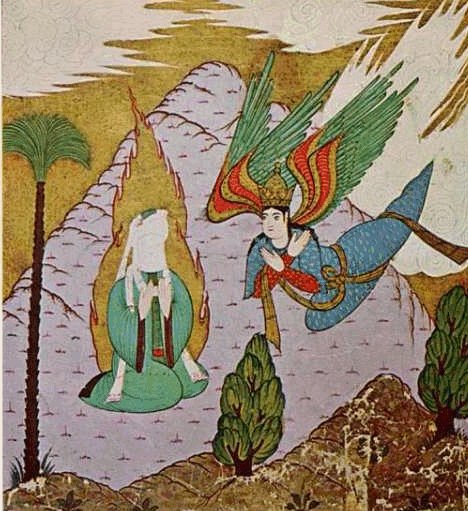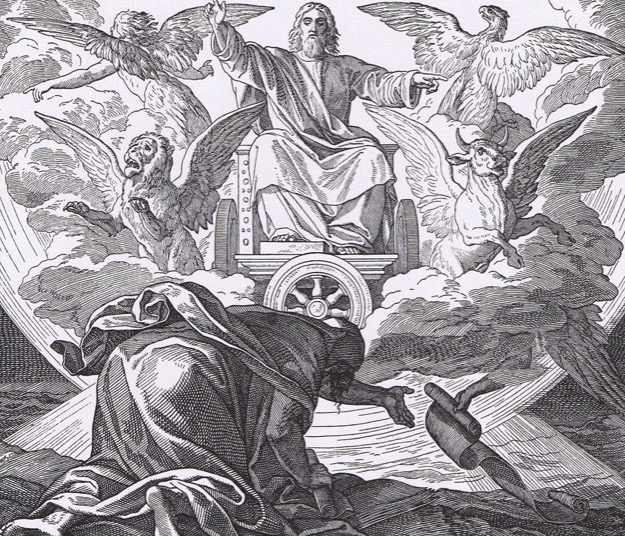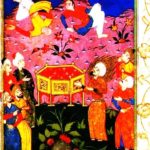I believe that this surah comes after Waraqah dies and, I believe, in the hiatus, Muhammad’s son, commonly known as Abd Allah, dies in infancy here, too.
‘Abd Allah is no more than a footnote in the Islamic sources. There is not a single ayah about him or even one ahadith that is about anything other than his mere existence. He is thought to have been born in the time after Muhammad received the revelation, unlike his other son, al-Qasim, who was born in the time of Ignorance.
There is also quite a bit of confusion over the name of this child. He is also called al-Tahir (the Pure) and al-Tayyib (the Clean). Both al-Tahir and al-Tayyib are meanings that would fit this timeline of Islam–and these names are actually better known than that of ‘Abd Allah. ‘Abd Allah does not fit this time period in Islam. Not one Quranic verse yet uses the name Allah. The only name that is used is al-Rab, or the Lord, so the name ‘Abd Allah is completely anachronistic. I am also not confident that there was only one child born after Islam–there may have been stillbirths or late miscarriages that makes sense of the muddled tradition of Muhammad’s son(s) during this time.
At any rate, I place the deaths at this time because of the stark lack of ahadith about them and because of Khadija’s age–the older she got, the less likely it would be that she’d have another child–and also because there’s a distinct crisis of faith here that fits these traumatic events. When the revelations pick up again, they will contain no new information of ancients or any other source for quite some time, as well, so this fits Muhammad being cut off from whatever knowledge Waraqah possessed. This is one of the periods when Muhammad was depressed to the point of suicide, running up mountains to throw himself down in despair, according to the Islamic sources, so this all fits well together here.
There are multiple ahadith for this, all of which surround a halt in the revelations.
Here are the different versions, helpfully recored in the Tasfir of ibn al-Kathir:
Imam Ahmad recorded from Jundub that he said, “The Prophet became ill, so he did not stand for prayer for a night or two. Then a woman came and said, `O Muhammad! I think that your devil has finally left you.’ So Allah revealed [this surah]. …
In a narration from Al-Aswad bin Qays, he said that he heard Jundub say that Jibril was slow in coming to the Messenger of Allah. So the idolators said, “Muhammad’s Lord has abandoned him.” So Allah revealed [this surah].
Al-`Awfi reported from Ibn `Abbas, “When the Qur’an was revealed to the Messenger of Allah, Jibril was delayed from coming to him for a number of days (on one occasion). Therefore, the Messenger of Allah was affected by this. Then the idolators began to say, `His Lord has abandoned him and hates him.’ So Allah revealed [this surah].
Some traditions specifically blame his next-door neighbor’s wife, Umm Jamil, Abu Lahab’s wife, for this. According to Maududi, the length of time in this specific case was unknown: “Different traditions have mentioned different durations of this period. Ibn Juraij has mentioned it to be 12 days, Kalbi 15 days, Ibn ‘Abbas 25 days, and Suddi and Muqatil have stated that it extended to 40 days.”
Wahidi adds this detail:
Hisham ibn ‘Urwah narrated from his father who related: “Gabriel, peace be upon him, was late in coming to the Prophet, Allah bless him and give him peace, and this caused him tremendous distress. Khadijah said to him: ‘Your Lord has forsaken you because of the distress He sees in you!’ And so Allah, exalted is He, revealed [this surah].
He also records a detail that shows that it was customary for Muhammad to tremble and shake under a garment when he was receptive to prophecy, as people did in Merkabah mysticism, something we saw in The Cloaked One (Al-Muddaththir), surah 74. It’s also the first instance of Muhammad’s prophecies being stopped by a dog!
Hafs ibn Sa‘id al-Qurashi who related that his mother has related from Khawlah, a servant of the Messenger of Allah, Allah bless him and give him peace, that a dog entered the Prophet’s house, went under the bed and later died there. Days passed by and the Prophet, Allah bless him and give him peace, did not receive any revelation. He said: “O Khawlah, what has happened in my house? Gabriel, peace be upon him, has stopped coming to me”. Khawlah said: “I will tidy the house and sweep the floor”. When she tried to sweep under the bed, she felt something heavy. She got it out and found it was a dog. She took the dog out and threw it behind a wall. The Prophet, Allah bless him and give him peace, then came in with his jawbones trembling — whenever revelation came to him he shivered — and said: “O Khawlah, cover me!” Allah, exalted is He, revealed to him [this surah].
This short surah was revealed in two pieces which probably occurred pretty close together. The second part likely dates soon after and reflects some of the alterations that were made about the same time to al-Fajr, The Dawn, with the added bits about orphans–this seems to be the genesis of the specific concern about orphans.
Allah comforts Muhammad, the orphan
- By the bright-forenoon,
- And the night when it is settles,
- Your Lord did not forsake you and he did not hate (you).
- And surely the Hereafter is better for you than the first.
- And surely soon your Lord will give you and so you will be satisfied.
- And did he not find you an orphan and shelter you?
- And he found you wandering, so he guided,
- And he found you needy, so he sufficed [you].
Ironically, the word translated here as “suffice” is the same word the is used to refer to the moral error of believing oneself self-sufficient in Surah 92:8.
This seems to inspire the next revelation that is probably the first time that orphans are specifically mentioned as appropriate subjects of charity, which comes in the next revelation:
Allah orders generosity toward orphans
- So as for the orphan, then do not subjugate,
- And as for the petitioner, then do not repel,
- But as for the favor of your Lord, report [it]!
The last command is to Muhammad, telling him to continue to spread the knowledge of the Code to his people.





